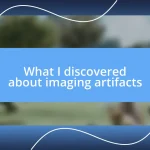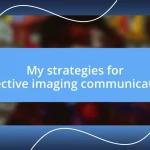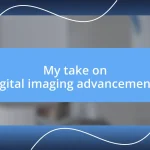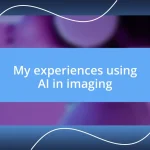Key takeaways:
- CRISPR technology offers groundbreaking potential for gene editing, raising ethical concerns about unintended consequences, access, and moral boundaries.
- Engaging in open dialogues among diverse voices enhances understanding of the ethical implications of CRISPR and promotes responsibility in scientific advancements.
- The need for regulatory frameworks is vital to balance innovation with caution, ensuring that the benefits of CRISPR are accessible and ethically sound for all communities.

Understanding CRISPR Technology
CRISPR technology, or Clustered Regularly Interspaced Short Palindromic Repeats, is like a pair of scissors for DNA. It allows scientists to make precise edits in the genome, which can lead to revolutionary advancements in medicine, agriculture, and beyond. I remember the first time I learned about CRISPR—it felt like discovering a hidden key to unlock doors we never thought possible.
What strikes me is the way CRISPR harnesses a natural defense mechanism found in bacteria, allowing them to fight off viruses. Imagine that—a tiny organism using a sophisticated method to protect itself! It’s fascinating to think how we can adapt such an evolutionarily refined tool for our own purposes. Have you ever stopped to ponder how such a simple yet powerful concept can transform our understanding of genetics?
As I delve deeper into the nuances of CRISPR, I can’t help but think about its potential implications. The ability to edit genes carries immense promise, but it also raises important questions about the ethics involved. How do we balance innovation with responsibility? These are conversations we need to have as we navigate this brave new world.

Ethical Concerns in Gene Editing
When diving into the ethics of gene editing, I often find myself reflecting on the profound implications of altering life at its most fundamental level. Each gene we edit could potentially lead to unintended consequences, much like pulling a thread on a finely woven tapestry. The fear of creating ‘designer babies’ or enhancing traits like intelligence or beauty poses a slippery slope I’m uncomfortable with. It’s a topic that gets me thinking about whether we are truly ready for such responsibilities.
Here are some key ethical concerns that resonate with me:
- Unintended Consequences: Each edit can have unforeseen effects, potentially leading to new health issues.
- Access and Equity: Who will benefit from these advancements? Will they be available to everyone or just the privileged few?
- Consent: Editing genes in embryos raises questions about consent, as the future individuals cannot agree to the changes made.
- Biodiversity: Targeting specific traits might lead to a reduction in genetic diversity, posing risks to ecosystems and resilience.
- Moral Boundaries: Where do we draw the line in our pursuit of perfection? There’s a delicate balance between treatment and enhancement that we must carefully navigate.
I genuinely worry about the direction of gene editing if we rush into it without fully understanding its ethical ramifications. The conversations surrounding these topics are not just academic for me—they feel like crucial discussions that will shape the future of humanity.

Personal Journey with CRISPR
During my foray into the world of CRISPR, I had the opportunity to attend a genomic science conference that opened my eyes to the marvels of this technology. I remember sitting in a crowded room, filled with researchers passionately discussing their latest findings. It filled me with a sense of awe to realize how many brilliant minds were collectively harnessing CRISPR’s potential to tackle diseases we once thought incurable, like sickle cell anemia. The excitement in the air was palpable, and it made me enthusiastic about the future of medicine—there’s something incredibly invigorating about being part of such a groundbreaking movement.
Comparing the excitement and vague trepidation I felt then with now, I can see how my understanding has deepened. I think back to the discussions with my peers about the ethical boundaries we should observe. One particular conversation stands out in my memory—my colleague passionately argued that we must tread carefully to preserve the dignity of human life. Listening to their fears made me realize we aren’t just dealing with science; we’re tampering with destiny itself. Have you ever found yourself torn between the thrill of discovery and the weight of responsibility? It’s a delicate balance that lingers in my mind, prompting me to reflect on my values and the future we are shaping.
Now, as I ponder over my personal journey with CRISPR, I feel a blend of fascination and uncertainty. I think about how these experiences could shape not only scientific advancements but also my professional ethos moving forward. I often remind myself that as we push the boundaries of science, we must remain anchored in our ethical responsibilities. This journey isn’t just about what we can do; it’s about what we should do.
| Aspect | My Feelings |
|---|---|
| Excitement | Gained from innovative possibilities and community engagement during the conference. |
| Trepidation | Concern about ethical implications and responsibility when discussing gene editing. |

Impact of CRISPR on Society
The impact of CRISPR on society is nothing short of transformative. I recall a moment at a local biotech event where a researcher shared her story about using CRISPR to tackle genetic disorders in underserved communities. Her passion was infectious; it made me realize how this technology could bridge health disparities. Isn’t it fascinating to think about how a single scientific advancement can change countless lives for the better?
As I reflect on the societal implications of CRISPR, I often find myself grappling with concerns about regulation. The speed at which CRISPR is advancing leaves me wondering: are we prepared for the ethical dilemmas it brings? I’ve spoken to colleagues who argue that, without stringent guidelines, we might see a surge in experiments that could yield unforeseen consequences or even exploit vulnerable populations. The excitement of progress is undeniable, but I can’t shake off the concerns about where that progress might lead us.
Moreover, the cultural conversations surrounding gene editing have ignited passionate debates. I remember an animated discussion with friends over dinner about the potential of CRISPR to eliminate hereditary diseases. While the prospect filled us with hope, we also questioned the moral implications of ‘playing God.’ It’s moments like these that forge a deeper understanding of how CRISPR could shift our values and beliefs about life itself. Are we ready to face these challenges as a society? That’s the question I find myself pondering time and again.

Balancing Innovation and Ethics
Navigating the balancing act between innovation and ethics in CRISPR feels like walking a tightrope. I recall a pivotal moment during a lab meeting where we discussed the potential to edit genes for enhanced agricultural traits. While the benefits sounded promising, my thoughts quickly shifted to the unintended consequences this could have on ecosystems. How do we determine the right course of action when the stakes are so high? It’s a heavy question that lingers in my mind long after such discussions.
I find myself often thinking about the stories shared by scientists about their breakthrough discoveries. Yet, it’s always essential to weigh these advances against the ethical implications they carry. I remember a poignant reflection from a mentor who warned that just because we can do something, doesn’t mean we should. This perspective resonates deeply with me, especially when I see young researchers eager to push boundaries without fully embracing their responsibility. Ethics must serve as our compass in this thrilling journey through uncharted territory.
As I engage in dialogues about CRISPR, I can’t help but wonder: what legacy are we building? The stories of patients relieved from genetic burdens are heartwarming, yet they bring a twinge of fear about the societal impact of genetic privilege. In conversations with friends, I’ve often posed the question: Are we prepared for a future where access to these advancements is determined by socioeconomic status? These ethical considerations mold not only our present narratives but will undoubtedly influence the collective conscience of future generations.

Future of CRISPR Regulations
As I look ahead, the regulatory landscape for CRISPR is bound to evolve significantly. I participated in a recent symposium where industry leaders stressed the necessity for international agreements on gene editing standards. The debate left me pondering: how do we create a framework that is both flexible to innovation and strict enough to protect vulnerable populations?
One moment that struck me was when a young researcher asked, “If we can edit genes to eradicate diseases, why are there still roadblocks?” It’s a fair question, and it got me thinking about the balance between ambition and caution. In my experience, the challenge lies not just in the science itself but in societal readiness to embrace it responsibly. Regulation will play a key role in ensuring that the promises of CRISPR don’t outpace our ethical considerations.
I sometimes envision a future where regulatory bodies engage in open dialogues with communities affected by gene editing. This collaborative approach could foster transparency and trust. Isn’t it essential that we not only consider the science but also the stories and concerns of everyday people as we chart this new territory? Addressing these emotional and ethical layers might be the key to shaping a responsible future for CRISPR.

Lessons Learned from My Experience
One key lesson I learned is the importance of open dialogue when it comes to CRISPR and ethics. I vividly recall a discussion with a diverse group of specialists, each bringing their unique perspective to the table. It struck me how differing backgrounds—scientists, ethicists, and even laypeople—revealed layers of complexity I hadn’t considered before. Isn’t it fascinating how our varied experiences can illuminate blind spots? This reinforced my belief that multi-faceted conversations are vital for navigating the ethical challenges we face.
Another lesson was around the concept of responsibility. I remember grappling with the initial excitement of CRISPR’s potential to cure diseases, but it soon dawned on me that the real work began after the discovery. It’s like the feeling you get after finishing a thrilling book—you’re left with lingering questions about the journey and its characters. I found myself reflecting deeply on the lives impacted by our research and how each decision creates ripples far beyond the lab. How do we ensure that our enthusiasm for innovation doesn’t overshadow our duty to humanity?
Finally, I’ve come to appreciate the power of empathy in the scientific process. During a community outreach event, I listened to a mother share her fears about potential genetic editing. As she spoke, I felt a wave of emotion wash over me; her concerns were rooted in love and the desire to protect her child. In that moment, it became clear to me: our work in CRISPR isn’t just about science but about real people. How can we genuinely advance if we overlook the human element? Integrating empathy into our scientific discussions can guide us toward more ethical outcomes, ensuring we act as stewards of the technology rather than just its creators.














